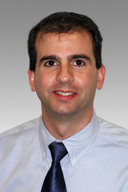Wnt-Dependent Stem Cell Populations in Breast Tissue
Michael Musci
Appointment Period: 2003-2004 / Grant Year: [19]
 My work focused on identifying stem cell populations in breast tissue that may contribute to cancer. Most women with breast cancer have no identifiable risk factors and the types of cells which give rise to breast tumors remains a mystery. All adult tissues arise from stem cells. These cells have the ability to divide and give rise to mature cells that make up a fully developed organ. Stem cells also give rise to cells that remain immature and capable of self renewal. The ability of stem cells to self renew and provide daughter cells that mature into a specific part of an organ is critical for organ development, repair, aging, and cancer formation. The formation of tumors from stem like cells within an organ has been best demonstrated in cancer models of the skin and intestine. The relation of stem cells in breast tissue and cancer is less clear.
My work focused on identifying stem cell populations in breast tissue that may contribute to cancer. Most women with breast cancer have no identifiable risk factors and the types of cells which give rise to breast tumors remains a mystery. All adult tissues arise from stem cells. These cells have the ability to divide and give rise to mature cells that make up a fully developed organ. Stem cells also give rise to cells that remain immature and capable of self renewal. The ability of stem cells to self renew and provide daughter cells that mature into a specific part of an organ is critical for organ development, repair, aging, and cancer formation. The formation of tumors from stem like cells within an organ has been best demonstrated in cancer models of the skin and intestine. The relation of stem cells in breast tissue and cancer is less clear.
The Wnt signaling pathway is one such signal that has been shown to be critical for normal tissue development. Furthermore, aberrant wnt signaling causes tumor formation in mouse models of breast cancer. We developed a protocol specifically for use of antibodies on breast tissue sections to allow staining of cells with active wnt signaling. One consequence of wnt signaling is the expression of genes based on specific sequences of DNA responsive to wnt signals. We made sections of breast tissue from such mice in search of the cells with active wnt signaling in breast tissue. We identified wnt activity in areas of the skin as expected but found little activity in normal breast tissue by this method. Stem cells in the breast are small in number, probably less than 1% according to studies of cells with self renewing properties from primary breast cell cultures. Also, we have begun work with a new generation of brighter fluorescent proteins that will increase the sensitivity to detect wnt activity in vivo. This work has contributed to our ability to test for and study cells in breast tissue that have stem like properties.
 My work focused on identifying stem cell populations in breast tissue that may contribute to cancer. Most women with breast cancer have no identifiable risk factors and the types of cells which give rise to breast tumors remains a mystery. All adult tissues arise from stem cells. These cells have the ability to divide and give rise to mature cells that make up a fully developed organ. Stem cells also give rise to cells that remain immature and capable of self renewal. The ability of stem cells to self renew and provide daughter cells that mature into a specific part of an organ is critical for organ development, repair, aging, and cancer formation. The formation of tumors from stem like cells within an organ has been best demonstrated in cancer models of the skin and intestine. The relation of stem cells in breast tissue and cancer is less clear.
My work focused on identifying stem cell populations in breast tissue that may contribute to cancer. Most women with breast cancer have no identifiable risk factors and the types of cells which give rise to breast tumors remains a mystery. All adult tissues arise from stem cells. These cells have the ability to divide and give rise to mature cells that make up a fully developed organ. Stem cells also give rise to cells that remain immature and capable of self renewal. The ability of stem cells to self renew and provide daughter cells that mature into a specific part of an organ is critical for organ development, repair, aging, and cancer formation. The formation of tumors from stem like cells within an organ has been best demonstrated in cancer models of the skin and intestine. The relation of stem cells in breast tissue and cancer is less clear.